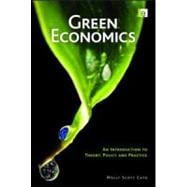
Note: Supplemental materials are not guaranteed with Rental or Used book purchases.
Purchase Benefits
What is included with this book?
| List of Photographs, Figures, Tables and Boxes | p. ix |
| Acknowledgements | p. xiii |
| Preface | p. xv |
| p. 1 | |
| Why green economics? | p. 2 |
| What is green economics? | p. 5 |
| From economic growth to a balanced economy | p. 9 |
| Why green economics now? | p. 11 |
| Where do we go from here? | p. 13 |
| Theory | |
| Where Did It All Start? | p. 17 |
| Intellectual roots: Greeks, socialists and anarchists | p. 18 |
| Spiritual dimensions | p. 19 |
| Key figures and ideas | p. 21 |
| Challenging economics in the academy | p. 30 |
| Economics and Identity | p. 35 |
| Sustainability values, not monetary value | p. 35 |
| The guiding vision: Balance, not growth | p. 38 |
| Economics and relationship | p. 41 |
| Re-embedding economics in nature | p. 45 |
| Not squaring the circle but closing the loop | p. 47 |
| Vision For The Future | |
| Work | p. 55 |
| Will a green economy mean more work or less? | p. 56 |
| Whose work is it anyway? | p. 59 |
| Deskilling and reskilling | p. 61 |
| Greening production and distribution | p. 64 |
| Money | p. 71 |
| The politics of money | p. 72 |
| Money and global injustice | p. 74 |
| Money creation: Financially and ecologically unstable | p. 77 |
| How money wastes people | p. 79 |
| Local currencies for a localized world | p. 81 |
| Conclusion | p. 85 |
| Green Business: From Maximizing Profits to a Vision of Conviviality | p. 89 |
| Limitations of market and technological solutions | p. 90 |
| Issues of scale and ownership | p. 92 |
| Learning to switch the lights off | p. 95 |
| Low-carbon growth as the flourishing of the convivial economy | p. 98 |
| The Policy Context | p. 105 |
| The ecological modernization discourse | p. 106 |
| Policy responses to climate change | p. 109 |
| What's wrong with GDP? | p. 113 |
| Measuring what we value | p. 116 |
| Globalization and Trade | p. 123 |
| Whose comparative advantage? | p. 124 |
| How free is free trade? | p. 126 |
| Trade in the era of climate change and peak oil | p. 129 |
| Greening trade locally | p. 131 |
| Greening trade globally | p. 134 |
| Relocalizing Economic Relationships | p. 139 |
| Localization to replace globalization | p. 139 |
| Political protection for local economies | p. 142 |
| Self-reliant local economies on the ground | p. 144 |
| The next step: The bioregional economy | p. 150 |
| Conclusion | p. 153 |
| Green Taxation | p. 157 |
| Theory of green taxation | p. 157 |
| Strategic taxation | p. 160 |
| Taxes on commons | p. 162 |
| Ecotaxes | p. 164 |
| Green Welfare | p. 171 |
| Green approaches to social policy | p. 171 |
| What is poverty? What is welfare? | p. 173 |
| Sharing the wealth; sharing the poverty | p. 176 |
| What is the welfare state? | p. 179 |
| Citizens' Income and people's pensions | p. 181 |
| A health service, not an illness service | p. 183 |
| Land and the Built Environment | p. 187 |
| Land and economics | p. 187 |
| Taxing land | p. 190 |
| Building on land | p. 193 |
| Growing on the land | p. 197 |
| Summary and Further Resources | p. 205 |
| Index | p. 219 |
| Table of Contents provided by Ingram. All Rights Reserved. |
The New copy of this book will include any supplemental materials advertised. Please check the title of the book to determine if it should include any access cards, study guides, lab manuals, CDs, etc.
The Used, Rental and eBook copies of this book are not guaranteed to include any supplemental materials. Typically, only the book itself is included. This is true even if the title states it includes any access cards, study guides, lab manuals, CDs, etc.